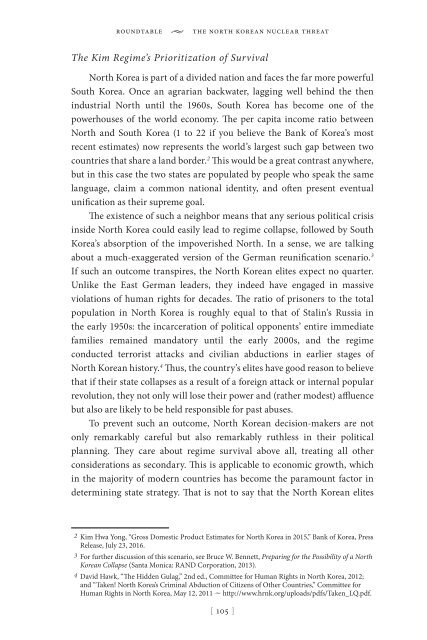2jBVKVf
2jBVKVf
2jBVKVf
Create successful ePaper yourself
Turn your PDF publications into a flip-book with our unique Google optimized e-Paper software.
oundtable • the north korean nuclear threat<br />
The Kim Regime’s Prioritization of Survival<br />
North Korea is part of a divided nation and faces the far more powerful<br />
South Korea. Once an agrarian backwater, lagging well behind the then<br />
industrial North until the 1960s, South Korea has become one of the<br />
powerhouses of the world economy. The per capita income ratio between<br />
North and South Korea (1 to 22 if you believe the Bank of Korea’s most<br />
recent estimates) now represents the world’s largest such gap between two<br />
countries that share a land border. 2 This would be a great contrast anywhere,<br />
but in this case the two states are populated by people who speak the same<br />
language, claim a common national identity, and often present eventual<br />
unification as their supreme goal.<br />
The existence of such a neighbor means that any serious political crisis<br />
inside North Korea could easily lead to regime collapse, followed by South<br />
Korea’s absorption of the impoverished North. In a sense, we are talking<br />
about a much-exaggerated version of the German reunification scenario. 3<br />
If such an outcome transpires, the North Korean elites expect no quarter.<br />
Unlike the East German leaders, they indeed have engaged in massive<br />
violations of human rights for decades. The ratio of prisoners to the total<br />
population in North Korea is roughly equal to that of Stalin’s Russia in<br />
the early 1950s: the incarceration of political opponents’ entire immediate<br />
families remained mandatory until the early 2000s, and the regime<br />
conducted terrorist attacks and civilian abductions in earlier stages of<br />
North Korean history. 4 Thus, the country’s elites have good reason to believe<br />
that if their state collapses as a result of a foreign attack or internal popular<br />
revolution, they not only will lose their power and (rather modest) affluence<br />
but also are likely to be held responsible for past abuses.<br />
To prevent such an outcome, North Korean decision-makers are not<br />
only remarkably careful but also remarkably ruthless in their political<br />
planning. They care about regime survival above all, treating all other<br />
considerations as secondary. This is applicable to economic growth, which<br />
in the majority of modern countries has become the paramount factor in<br />
determining state strategy. That is not to say that the North Korean elites<br />
2 Kim Hwa Yong, “Gross Domestic Product Estimates for North Korea in 2015,” Bank of Korea, Press<br />
Release, July 23, 2016.<br />
3 For further discussion of this scenario, see Bruce W. Bennett, Preparing for the Possibility of a North<br />
Korean Collapse (Santa Monica: RAND Corporation, 2013).<br />
4 David Hawk, “The Hidden Gulag,” 2nd ed., Committee for Human Rights in North Korea, 2012;<br />
and “Taken! North Korea’s Criminal Abduction of Citizens of Other Countries,” Committee for<br />
Human Rights in North Korea, May 12, 2011 u http://www.hrnk.org/uploads/pdfs/Taken_LQ.pdf.<br />
[ 105 ]


